一、创建一个数据库
create database testnewman;
show databases;
这个可以告诉你这个库在或者不在;不存在创建,如果存在则不创建
CREATE DATABASE IF NOT EXISTS testnewman DEFAULT CHARSET utf8 COLLATE utf8_general_ci;

二、使用表
use testnewman;
select database(); #查看你当前使用的库是谁
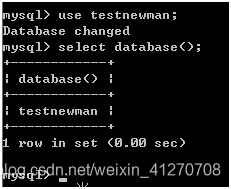
# drop database testnewman; #删除表,建议最后再操作;删完之后需重新创建
show tables; #查询表
三、创建表
3.1创建student表
create table student(id int(11) NOT NULL AUTO_INCREMENT,
name varchar(20),
sex varchar(6),
submission_date date,
PRIMARY KEY (id)
)engine=innodb DEFAULT CHARSET=utf8;
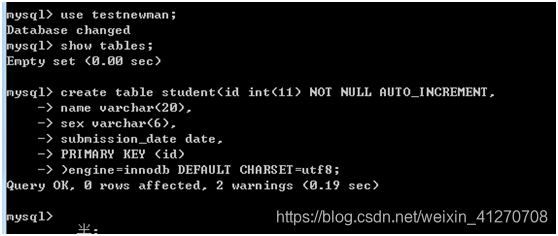
3.2创建id表
create table id(id int);
insert into id values(2);
insert into id values(3);
insert into id values(4);
insert into id values(5);
select *from id;
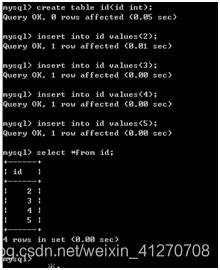
四、插入数据
insert into student values(1,"小吴","男","2018-10-10");
insert into student values(2,"小张","女","2017-9-10");
insert into student values(3,"小李","女","2016-9-10");
insert into student values(4,"小程","男","2015-9-10");
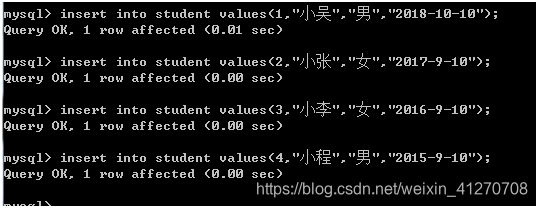
五、查询数据
5.1 where查询
select * from student;
select * from student where id=1;
select * from student where sex="男";
select name as "男" from student where sex="男";
select name as "男" from student where sex="男" limit 1;
select name as "男" from student where sex="男" limit 1,1;
select name as "男" from student where sex ='男' and id =4;
select name as "男" from student where sex ='男' or id =4;
select name as "男" from student where submission_date >"2018-01-01";
select name as "男" from student where submission_date <>"2018-01-01";
select count(*),sex from student group by sex;
select count(*),sex from student where id <3 group by sex;
select count(*),sex from student where id >1 group by sex having count(*)=1;
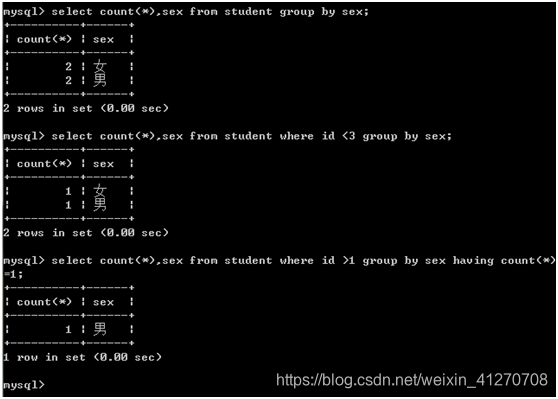
5.2 in、not in查询
select * from student where id in (1,2);
select * from student where id not in (1,2);
select * from student where id in (select * from id where id>3);
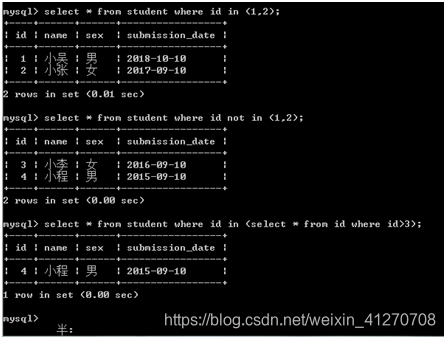
六、左连接、右连接
6.1 创建表及插入数据
6.1.1创建A表
create table A(id int not null auto_increment,
name varchar(20) not null,
sex varchar(6),
salary varchar(20),
department_id int,
PRIMARY KEY (id)
)
engine=innodb DEFAULT CHARSET=utf8;
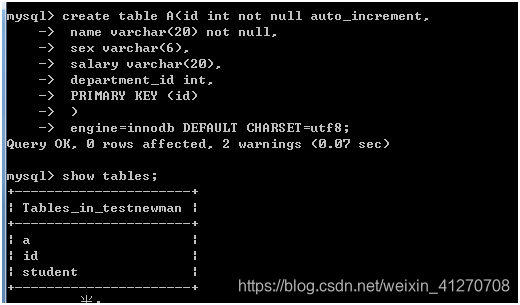
6.1.2创建department表
create table department(
id int not null auto_increment,
department_name varchar(20) not null,
PRIMARY KEY (id)
)engine=innodb DEFAULT CHARSET=utf8;

6.1.3表中插入数据
insert into department values(1,"Hr");
insert into department values(2,"IT");
insert into department values(3,"OP");
insert into department values(4,"Finance");
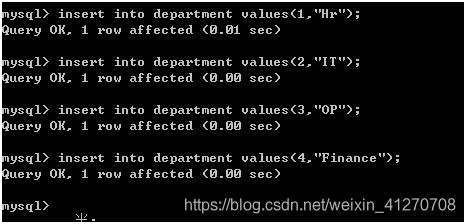
insert into A values(1,"jone","male",100,1);
insert into A values(2,"Jane","female",60,2);
insert into A values(3,"Jason","female",50,3);
insert into A values(4,"Jordan","male",20,10);
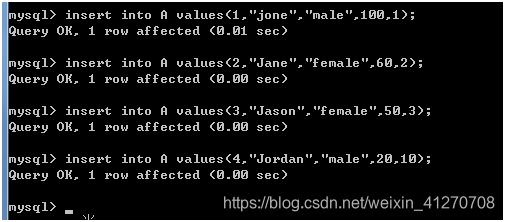
6.2 内连接
select person.name,depart.department_name from
A as person inner join department as depart on
person.department_id = depart.id;
或者
select person.name,depart.department_name from
A as person join department as depart on
person.department_id = depart.id;
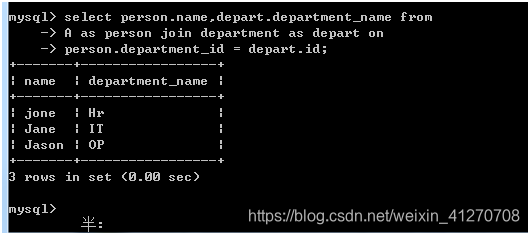
不推荐使用内连接,不会使用索引,扫描速度比较慢;数据多时可能带来灾难;
6.3 左连接
select person.name,depart.department_name from
A as person left join department as depart on
person.department_id = depart.id;
备注:会把(左表)A表中所有字段列出来
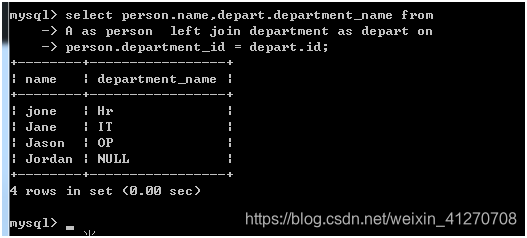
6.4 右连接
select person.name,depart.department_name from
A as person right join department as depart on
person.department_id = depart.id;
备注:会把(右表)depart中所有字段列出来
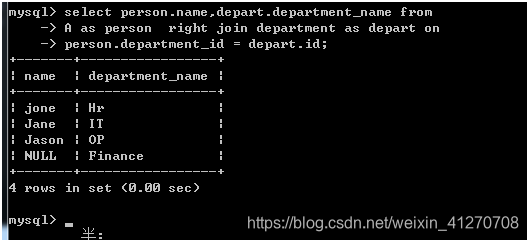
取多个字段
select person.*,depart.* from
A as person right join department as depart on
person.department_id = depart.id;
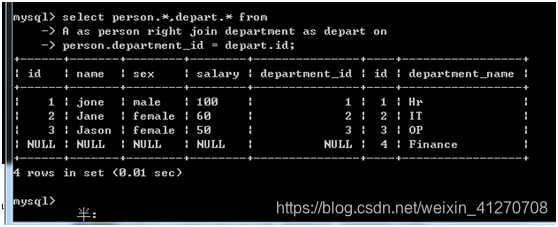
6.5 union与union all的使用
6.5.1 union的使用
select name from A
union
select department_name from department;
备注:把两个结果合并
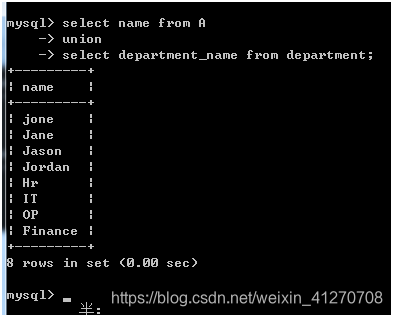
6.5.2 union all的使用
select name from A
union all
select department_name from department;
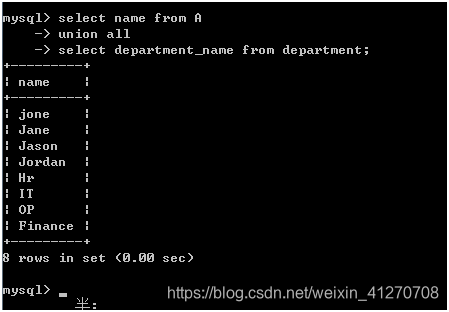
6.5.3 union和union all的差异
备注:union 合并会排重
代码部分:
select id from A
union all
select id from department;
select id from A
union
select id from department;
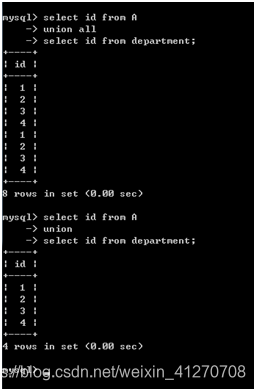
七、用mysql造100条数据
7.1建表
7.1.1创建表studentInfo
create table studentInfo(
ID int not null auto_increment comment "不为空的自增长的主键ID",
student_id varchar(20) not null,
name varchar(30) not null,
sex char(4),
tel varchar(13) unique not null,
AdmissionDate datetime default '0000:00:00 00:00:00',
primary key (ID),
unique student_id(student_id)
)engine=innodb character set utf8 comment "学生信息表";
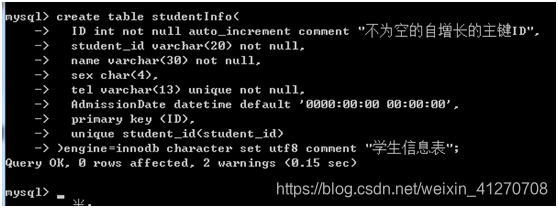
备注:unique当索引时不允许重复
7.1.2创建表grade
create table grade(
ID int auto_increment not null,
stuID varchar(20),
course varchar(20) not null,
score tinyint(4) default 0,
primary key (ID),
key idx_stuid(stuID),
CONSTRAINT FK_ID FOREIGN KEY(stuID) REFERENCES studentInfo(student_id)
)engine=innodb character set utf8 comment "学生成绩表";

7.2 数据库中插入100条数据
import pymysql
import random
def insertData():
conn=pymysql.connect("127.0.0.1","root","123456","testnewman",charset="utf8")
cur = conn.cursor()
conn.select_db("testnewman")
courseList = ['python', 'java', 'mysql', 'linux', '接口测试', '性能测试', '自动化测试','数据结构与算法']
for i in range(1, 101):
student_id = '201803' + '0' * (3 - len(str(i))) + str(i)
name = random.choice(['Lucy','Tom','Lily','Amy','Dave','Aaron','Baron']) + str(i)
tel = '1' + str(random.choice([3, 5, 7, 8])) + str(random.random())[2:11]
sex = random.choice(['女', '男'])
stuinfo_sql = "insert into studentInfo(student_id, name, sex, tel, AdmissionDate) \
values('%s', '%s', '%s', '%s', date_sub(now(),interval %s day))" \
%(student_id, name, sex, tel, random.randint(90, 120))
cur.execute(stuinfo_sql)
conn.commit()
for j in courseList:
grade_sql = "insert into grade(stuID,course,score) values('%s','%s',%s)" %(student_id,j,random.randint(80, 100))
cur.execute(grade_sql)
conn.commit()
cur.close()
conn.close()
insertData()
print("数据插入结束!")
运行结果:

查看数据:
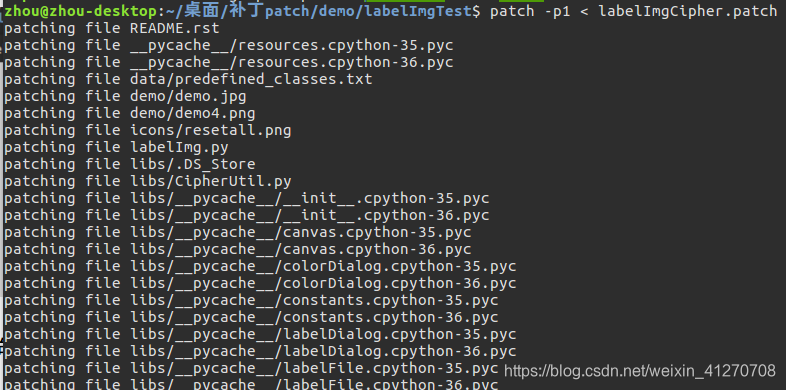
备注:
1、外键:保证数据一致性
两个表关联,必须同时存在
2、运行该程序前需要先在cmd中导入pymsql模块,命令如下:
py -3 -m pip install pymysql





















 904
904

 被折叠的 条评论
为什么被折叠?
被折叠的 条评论
为什么被折叠?








